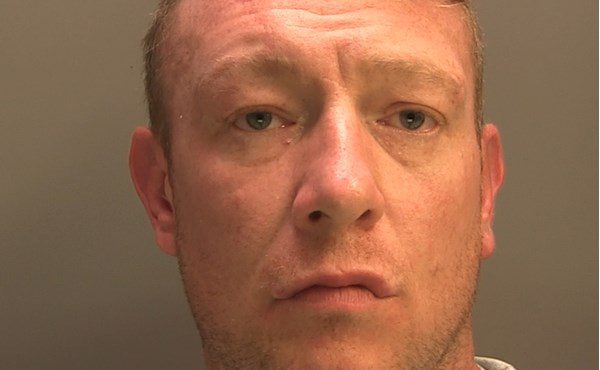
The man who stabbed and beat 38-year-old Tony McDermott to death in a sustained attack after he became convinced he had stolen from him, has today (26 April) been convicted of his murder.
Nicholas Ward, 38, of Eton Street, Grantham, carried out the brutal assault at his shared house in the early hours of 14 October last year after a night of drinking and taking drugs, during which he started to believe that McDermott had stolen his work tablet, and another electronic tablet used by his daughter.
A witness reported hearing him shout at his victim during the assault that he would lose his job if his work tablet was not returned to him. Tony repeatedly denied taking the tablets, but Ward did not believe him.
The brutal attack started shortly after 12.40am and lasted for around two hours. Tony tried to leave several times but Ward prevented him from doing so.
The tablets were later recovered by the police in a bag belonging to Ward.
Tony succumbed to his injuries at the scene.
Ward pleaded not guilty to the charge of murder, but was found guilty by a jury at Lincoln Crown Court, following a two-week trial. He will be sentenced on Thursday 2 May.
Senior Investigating Officer (SIO), Detective Chief Inspector Jennifer Lovatt, from Lincolnshire Police and the East Midlands Special Operations Unit’s (EMSOU) Major Crime Unit (MCU) led the investigation. She said: “Ward’s actions were completely and utterly unnecessary, and brutal. Ward’s belief that Tony had stolen from him, which then prompted such anger, had no foundation whatsoever.
“Had he checked his own bags properly, and listened to his friend who both denied stealing from him and pleaded with Ward to believe him, Tony’s family would not be without their loved one today. This attack was sustained, and cruel.
“I would like to pay tribute to Tony’s family for their strength in getting through what was a very difficult trial to listen to. It is finding justice for victims like Tony that we come to work for, and I hope that today his family will be able to start looking to the future and how that may now look without him.”
That explains what happened. Now, we will explain more about the investigation which led to Ward’s conviction.
Officers in the Force Control Room (FCR) received an emergency 999 call at 4.21am on Saturday 14 October reporting a man had been found with serious injuries at a house in Eton Street.
Officers were immediately deployed and within minutes found Tony with what were believed to be knife wounds. Crews from the East Midlands Ambulance Service (EMAS) were also in attendance, and they quickly assessed him as suffering multiple stab and slash wounds and other injuries all over his body. He was sadly pronounced dead at the scene.
Ward was quicky identified as the person responsible, and Response officers located and arrested him a short time later walking past McDonald’s with blood on his hands and clothes. This was later forensically tied to Tony.
Ward was interviewed over a period of three days. During his last interview, he produced a prepared statement claiming that he could not remember what had happened and he could not assist the police.
While this was happening, teams of detectives, Crime Scene Investigators (CSIs), digital media experts and forensics experts were building the case by combing every inch of the scene at Eton Street.
He was charged with murder at 5.02pm on 16 October and remanded into custody.
But the case and hard work does not end with a charge. Over a six-month period, the MCU built a clearer picture of what had happened. The team of detectives continued to work closely with a number of external experts, including forensic scientists and pathology, to understand what had happened that night, and the extent of the injuries inflicted.
They also worked with local teams including CSI’s, Neighbourhood Policing officers, Response colleagues, digital media experts, intelligence officers, and analysts. They conducted a large number of interviews with witnesses, carried out door to door enquiries, combed through hours of CCTV footage, mapped exhibits for evidence, and read through countless lines of data from mobile phones.
Detectives also worked closely with the Crown Prosecution Service to ensure the best available evidence was presented at trial.
At trial, Ward admitted that he had killed his friend but tried to maintain that he had lost control because he believed that Tony had stolen his work tablet. He also claimed he had acted in self-defence. The Judge ruled that there was a lack of evidence for the jury to consider loss of control, and the jury then rejected that he had acted in self-defence.
DCI Jen Lovatt added: “This was a case with an overwhelming amount of evidence to document and understand, and we needed to be incredibly thorough in doing this so that we could find justice for Tony. Every single person who contributed to that effort played their part in finding the truth of what happened in his final hours. It has been a very difficult and at times harrowing, case to work, but I am incredibly proud of everyone for their dedication in putting the victim, as they rightly should at the heart of every action.”




Leave a Reply
You must be logged in to post a comment.